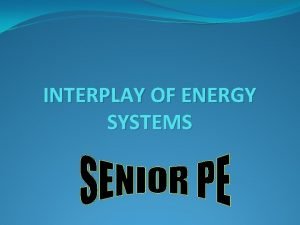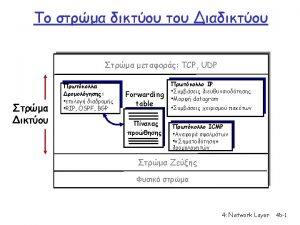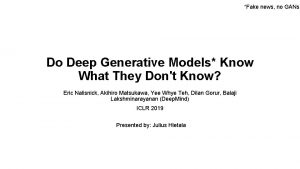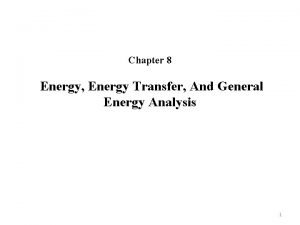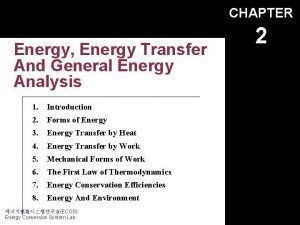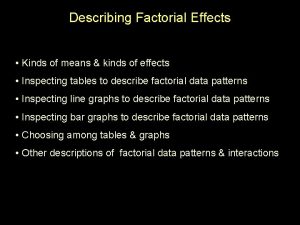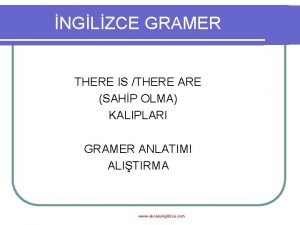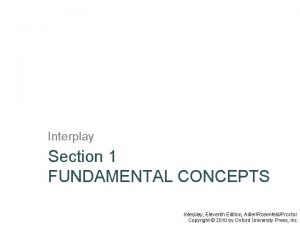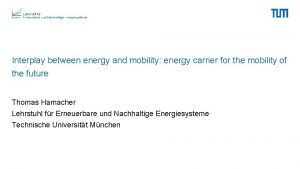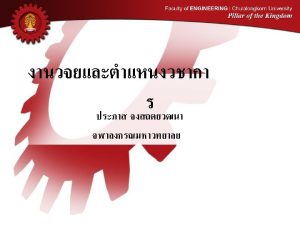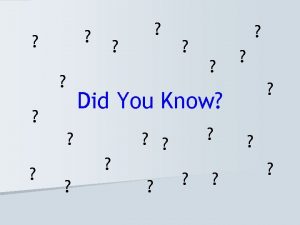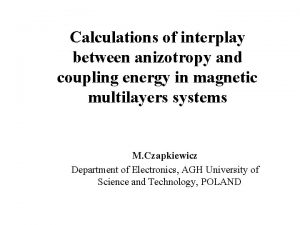INTERPLAY OF ENERGY SYSTEMS YOU KNOW THERE ARE
























- Slides: 24

INTERPLAY OF ENERGY SYSTEMS

YOU KNOW THERE ARE 3 ENERGY SYSTEMS, RIGHT? • ATP-PC (also called ATP-CP Phosphate/Phosphagen/ Phospho-Creatine/CP/PC/Alactacid system) fuelled by Creatine Phosphate • Lactic Acid (also known as Anaerobic Glycolysis/ Lactacid system) fuelled by Glucose (Glycogen) • Aerobic (also known as the Oxygen system) fuelled by Glucose (Glycogen), Fats and Protein

AT ANY GIVEN MOMENT, JUST ONE OF THOSE SYSTEMS WILL BE DOMINANT, BUT ALL 3 SYSTEMS ARE ALWAYS ACTIVE

The graph below is designed to show the 3 energy systems all working at once. This representation of a moderate to high intensity effort, shows how all systems start at the same time. As time goes by, each system assumes dominance at some point.

So, what situation will make one system dominant over the others? THE FACTORS WHICH AFFECT ENERGY SYSTEM DOMINANCE ARE: �INTENSITY OF EFFORT �DURATION OF EFFORT �FREQUENCY OF REQUIRED HIGH INTENSITY EFFORTS

SOME BACKGROUND INFO: �Because the Aerobic system is the most efficient system for producing energy (ie: resynthesize ATP) for most situations, the body will always try to use the Aerobic system predominantly �But, without sufficient oxygen (O 2) supply to the working muscles, the Aerobic system cannot be dominant �Increasing supply of O 2 to the muscles relies on increasing the breathing rate and depth(to get more O 2 into the body) and increasing the rate of circulation (increased heart rate to deliver the O 2 to the muscles) �THEREFORE, the higher the intensity of effort at the commencement of a new activity, the less likely it is that the Aerobic system can be immediately dominant SO….

IF A NEW ACTIVITY IS OF PARTICULARLY LOW INTENSITY… ……The Aerobic System can assume dominance immediately or almost immediately eg: walking Now back to the graph….

The initial intensity of effort detailed in the graph is high enough that it takes 60 seconds to increase O 2 supply to the muscles sufficiently for the Aerobic System to become dominant…. Can you see where the Aerobic System takes over as the dominant system? (see next slide)

X MARKS THE SPOT X

You should also be able to see that, prior to the Aerobic System becoming dominant, the two anaerobic systems were each, in turn, dominant for a short while. At the start, the ATP-PC system dominates , then the Lactic Acid System takes over for a while

In HIGH INTENSITY efforts… The ATP-PC system will initially be dominant, because… �It is the most efficient supplier for high intensity, short duration effort, because the chemical reactions required are quite simple �The initial effort level is beyond what can be predominantly supplied by the aerobic system and stays that way until O 2 delivery to the working muscles can be increased to appropriate levels

THE PROBLEM IS…. �The fuel supply (phospho-creatine) for the ATP-PC System can only last for around ten seconds of maximal effort – slightly longer if the effort is high but not maximal �After phospho-creatine is depleted, around 3 minutes of complete rest is needed to fully recover the c-p stores �If the intensity of effort continues, the dominance of the ATPPC system will diminish quickly…. … So, while the body is still trying to get sufficient O 2 to the muscles for the Aerobic System to take over dominance, the Lactic Acid System takes over

X The Lactic Acid System becomes dominant at the X

THE LACTIC ACID SYSTEM �Doesn’t need oxygen �Uses glucose (from the blood) and glycogen (stored in the muscles) as fuel �While not very efficient – it produces 2 ATP for every molecule of glycogen, while the Aerobic System produces 38 ATP per glycogen molecule – it can, for a period of up to around 2 -3 minutes, stay as the dominant supplier of your energy needs, during maximal or high intensity effort �Produces lactic acid as a by-product of energy production and high levels of lactic acid are associated with muscle fatigue

If the intensity of effort is continually high enough for the lactic acid system to stay dominant – ie: above 85% max effort, measured by 85% max HR (where max HR = 220 –age) – the muscles will fatigue and you will be unable to continue…. …. This is because, above 85% max effort (also recognised as the approximation of “lactate threshold”) it is generally not possible for the Aerobic System to achieve dominance. That is, it is generally not possible to get enough O 2 to the working muscles to allow for aerobic dominance, due to the limitations of lung capacity and heart rate increase.

This notion is displayed in the following diagram �As long as the effort is below 85% the Aerobic System can be dominant �When effort goes above that, the lactic acid system would become dominant �In the first two instances of exceeding the lactate threshold, the runner has to reduce intensity to avoid race-ending muscle fatigue. The third effort represents the runner’s sprint to the finish line

CONSIDER THE FOLLOWING… Assuming the pace is constant from the start of activity, do you think the effort level represented in the graph is above or below 85%? Q: Can you explain your answer? (see next slide)

A: it must be below 85%. . …because the graph shows that the aerobic system becomes the dominant energy system after about 60 seconds. If the effort level from the start was above 85%, the Lactic Acid System would have stayed dominant and the activity would have ended after 2 -3 minutes when muscle fatigue prevented continuation …further explanation follows…

IN THE ACTIVITY REPRESENTED IN THE GRAPH… …the effort level from the start must be reasonably high, probably above 70%, but below 85%. In the first minute or so, the body adjusts breathing rate and depth as well as heart rate, to increase O 2 delivery to the working muscles. Eventually, there is enough O 2 being absorbed by the muscles for the Aerobic System to become the dominant supplier of energy (continued next slide)

…Up to that point, the anaerobic systems have been dominant. �The relatively high intensity (in relation to the activity effort immediately prior to initiating the activity) means that the ATP-PC system will be initially dominant. �As that relatively high intensity of activity continues and the phospho-creatine stores in the muscle deplete, the ATP-PC System runs out of fuel. �The Lactic Acid System becomes dominant as the duration of the activity continues

SO, AS STATED EARLIER… THE FACTORS WHICH AFFECT ENERGY SYSTEM DOMINANCE ARE: �INTENSITY OF EFFORT �DURATION OF EFFORT �FREQUENCY OF REQUIRED HIGH INTENSITY EFFORTS If we apply this to field/court sports…

The factors are the same… …but the interplay of energy systems is a little more complex and the third factor becomes more critical Because activity in field sports is not continuous and constantly changes in intensity, the pattern of energy system dominance is not necessarily sequential (ie: ATP-PC system then Lactic Acid System then Aerobic System)

Below is an outline of when each energy system is dominant in field/court sports ATP-PC SYSTEM LACTIC ACID SYSTEM AEROBIC SYSTEM is dominant for • “one off” high intensity efforts of less than 10 seconds • repeated high intensity efforts of short duration as long as there is sufficient PC in the muscle to provide the necessary fuel eg: short sprints, skill performance, jumping • activity above 85% max effort and exceeding 10 consecutive seconds (RARE/UNLIKELY) • repeated high intensity efforts when there has been insufficient time to recover PC stores since the last similar effort (so the ATP-PC system cannot be dominant during ongoing high intensity efforts) eg: ongoing sprints/jumps/skill efforts, when c-p stores are depleted • activity that is sub maximal, below 85% max effort when breathing rate/heart rate are sufficient for the necessary oxygen delivery eg: slow to mid-paced running, recovery between efforts, rest breaks

ENERGY SYSTEM DOMINANCE IN FIELD/COURT SPORT SUMMARY �ALL SYSTEMS ARE ALWAYS INVOLVED TO SOME DEGREE �DOMINANCE WILL SHIFT FROM ONE SYSTEM TO THE NEXT, DEPENDING ON THE INTENSITY/DURATION/REPETITION OF EFFORT REQUIRED �THE ATP-PC SYSTEM WILL BE THE DOMINANT SYSTEM DURING SHORT DURATION, HIGH INTENSITY EFFORTS AS LONG AS THERE IS SUFFICIENT PHOSPHO-CREATINE IN THE WORKING MUSCLE �WHEN PC IS DEPLETED, THE LACTIC ACID SYSTEM WILL BE DOMINANT FOR ONGOING HIGH INTENSITY EFFORTS UNTIL THE MUSCLE’S PC STORES ARE REPLENISHED �THE CHANGE IN DOMINANCE, DEPENDING ON CIRCUMSTANCE, IS CALLED “INTERPLAY” OF ENERGY SYSTEMS
 Energy system interplay
Energy system interplay Antigentest åre
Antigentest åre Interplay between routing and forwarding
Interplay between routing and forwarding Https:/ / www.youtube.com/ watch?v=jnj8mc04r9e
Https:/ / www.youtube.com/ watch?v=jnj8mc04r9e Know history know self
Know history know self Do deep generative models know what they don’t know?
Do deep generative models know what they don’t know? Nothing formed against me shall stand song
Nothing formed against me shall stand song You know minecraft
You know minecraft If you are happy
If you are happy Personification in the raven
Personification in the raven If you're blue and don't know where to go
If you're blue and don't know where to go How do you know if you're asexual
How do you know if you're asexual Do you know who you are
Do you know who you are I will always follow you whenever and wherever you go i am
I will always follow you whenever and wherever you go i am I hope you know somebody loves you
I hope you know somebody loves you Energy energy transfer and general energy analysis
Energy energy transfer and general energy analysis Energy energy transfer and general energy analysis
Energy energy transfer and general energy analysis How to know if there is a main effect
How to know if there is a main effect You are good you are good when theres nothing good in me
You are good you are good when theres nothing good in me Tema there is there are
Tema there is there are What part of speech is open
What part of speech is open There is there are negative form
There is there are negative form There is there are cümleler
There is there are cümleler There is there are
There is there are There is there are
There is there are
